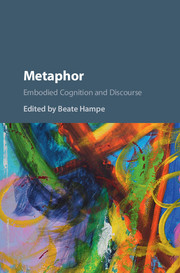Book contents
- MetaphorEmbodied Cognition and Discourse
- Metaphor
- Copyright page
- Contents
- Figures
- Tables
- Contributors
- Editor’s Preface and Acknowledgments
- Introduction
- Part I Metaphor in Cognition
- Part II More than Metaphor
- Part III Metaphor in Discourse
- 10 The Cancer Card: Metaphor, Intimacy, and Humor in Online Interactions about the Experience of Cancer
- 11 Mappings and Narrative in Figurative Communication
- 12 Contextual Activation of Story Simulation in Metaphor Comprehension
- 13 From Image Schema to Metaphor in Discourse: The FORCE Schemas in Animation Films
- 14 Doing Metaphor: An Ecological Perspective on Metaphoricity in Discourse
- Part IV Salient Metaphor
- Epilogue (A Personal View)
- References
- Person Index
- Subject Index
12 - Contextual Activation of Story Simulation in Metaphor Comprehension
from Part III - Metaphor in Discourse
Published online by Cambridge University Press: 05 July 2017
- MetaphorEmbodied Cognition and Discourse
- Metaphor
- Copyright page
- Contents
- Figures
- Tables
- Contributors
- Editor’s Preface and Acknowledgments
- Introduction
- Part I Metaphor in Cognition
- Part II More than Metaphor
- Part III Metaphor in Discourse
- 10 The Cancer Card: Metaphor, Intimacy, and Humor in Online Interactions about the Experience of Cancer
- 11 Mappings and Narrative in Figurative Communication
- 12 Contextual Activation of Story Simulation in Metaphor Comprehension
- 13 From Image Schema to Metaphor in Discourse: The FORCE Schemas in Animation Films
- 14 Doing Metaphor: An Ecological Perspective on Metaphoricity in Discourse
- Part IV Salient Metaphor
- Epilogue (A Personal View)
- References
- Person Index
- Subject Index
Summary
Recent research has produced evidence that both embodied simulations and abstract lexical processes are involved in language comprehension, with the balance between embodied and lexical processes influenced by the abstractness of the language and the cultural, social, and linguistic context. The role of simulations in processing metaphorical language, however, is subject to continued debate, not least because it is influenced by a variety of factors. In previous work (Ritchie 2017), I have shown that stories are often used as metaphors (metaphorical stories), and metaphors often imply or activate stories (story metaphors). In this chapter I argue that story metaphors have the potential to activate a rich and extended context and induce and shape both lexical elaboration and perceptual simulation. I propose that Context-Limited Simulation Theory (Ritchie 2006) provides a framework which is compatible with the experimental evidence about embodied simulation, and that a focus on story metaphors and the role of stories in metaphor use and comprehension will support our understanding of metaphor as shaped by both cognitive and discourse/social factors.
- Type
- Chapter
- Information
- MetaphorEmbodied Cognition and Discourse, pp. 220 - 238Publisher: Cambridge University PressPrint publication year: 2017
- 8
- Cited by



